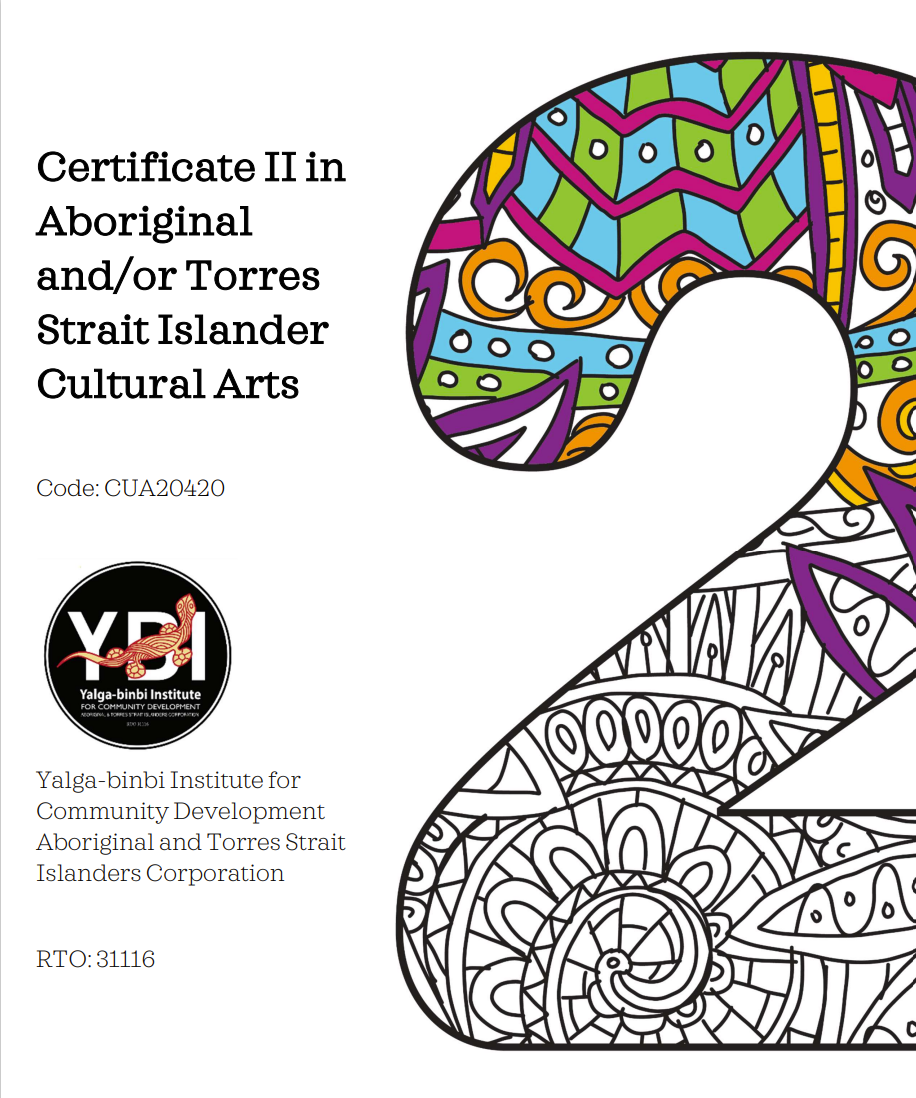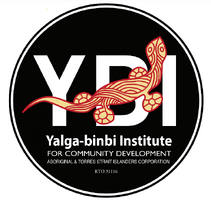SPECIAL MARITIME TRAINING CALENDAR
Certificate II in Aboriginal and/or Torres Strait Islander Cultural Arts
Qualification Code CUA20420
AU$3 320.00
CUA20420 - Certificate II in Aboriginal and/or Torres Strait Islander Cultural Arts (Release 1)
Save this product for later
Certificate II in Aboriginal and/or Torres Strait Islander Cultural Arts
Product Details
Modification History
|
Release |
Comments |
|
Release 1 |
This version first released with CUA Creative Arts and Culture Training Package Version 5.0. |
Qualification Description
This qualification reflects the role of Aboriginal and/or Torres Strait Islander people who are developing the basic creative and technical skills that underpin arts practice in an Aboriginal and/or Torres Strait Islander Cultural arts context. It applies to work in cultural arts environments within Aboriginal and/or Torres Strait Islander communities.
The job roles that relate to this qualification may include Aboriginal and/or Torres Strait Islander Community Arts Workshop Assistant and Aboriginal and/or Torres Strait Islander Ceramics Studio Assistant. It also provides a pathway to Aboriginal and/or Torres Strait Islander artist, crafting and design job roles.
Licensing, legislative, regulatory or certification considerations
Qualification
No licensing, legislative or certification requirements apply to this qualification at the time of publication.
Units of competency in qualification
Some individual units of competency may have their own licensing, legislative, regulatory or certification requirements. Users must check individual units of competency for licensing, legislative, regulatory or certification requirements relevant to that unit.
Entry Requirements
Nil
Packaging Rules
Total number of units = 10
5 core units plus
5 elective units , of which:
- 3 must be from electives listed below
- 2 may be from the remaining listed electives or any currently endorsed training package qualification or accredited course.
Elective units must be relevant to the work environment and the qualification, maintain the overall integrity of the AQF alignment, not duplicate the outcome of another unit chosen for the qualification, and contribute to a valid industry-supported vocational outcome.
Core units
BSBWHS211 Contribute to the health and safety of self and others
CUAACD101 Use basic drawing techniques
CUAATS111 Develop understanding of own Aboriginal and/or Torres Strait Islander identity
CUAATS211 Prepare for work in the Aboriginal and/or Torres Strait Islander cultural arts industry
CUAPPR211 Make simple creative work
Elective units
BSBCRT201 Develop and apply thinking and problem solving skills
BSBSTR301 Contribute to continuous improvement
BSBTEC101 Operate digital devices
BSBTEC201 Use business software applications
BSBTEC202 Use digital technologies to communicate in a work environment
BSBESB301 Investigate business opportunities
BSBSUS211 Participate in sustainable work practices
BSBPEF202 Plan and apply time management
BSBTWK201 Work effectively with others
CUAACD201 Develop drawing skills to communicate ideas
CUAATS212 Investigate and present features of Aboriginal and/or Torres Strait Islander culture
CUACER201 Develop ceramic skills
CUADAN211 Develop basic dance techniques
CUADAN214 Perform basic Aboriginal and/or Torres Strait Islander dance techniques
CUADES201 Follow a design process
CUADES202 Evaluate the nature of design in a specific industry context
CUADIG212 Develop digital imaging skills
CUADIG213 Develop video art skills
CUADRA201 Develop drawing skills
CUAGLA201 Develop glassworking skills
CUAIND211 Develop and apply creative arts industry knowledge
CUAIND212 Develop and apply knowledge of information and cultural services organisations
CUAJWL211 Develop jewellery-making skills
CUAPAI211 Develop painting skills
CUAPPR202 Participate in planning process for proposed artwork sites
CUAPPR203 Store finished creative work
CUAPRI211 Develop printmaking skills
CUASCU211 Develop sculptural skills
CUATEX201 Develop skills in textile work
CUAWHS111 Follow safe dance practices
CUAWOO201 Develop woodworking skills
ICTICT215 Operate digital media technology packages
MSTGN2013 Identify fibres, fabrics and textiles used in the TCF industry
MSTFD2001 Design and produce a simple garment
MSTFD2002* Apply printing techniques to produce indigenous textile designs
MSTFD2003* Apply dyeing techniques to produce indigenous textile designs
MSTFD2004 Work within an indigenous cultural framework
MSMPCII295 Operate manufacturing equipment
MSMPCII296 Make a small furniture item from timber
MSMPCII297 Make an object from cloth using an existing pattern
MSMPCII298 Make an object from metal
MSMPCII299 Make an object from plastic
MSATCM305A Demonstrate basic knowledge of casting operations
MSFGG3024 Form glass
MSFGN2001 Make measurements and calculations
MSFPF1001 Frame a simple artwork
MSFPF2014 Assemble basic artwork packages
MSFDG3003 Paint and fire glass
MSMPMC308 Operate slip casting equipment
MSMPMC310 Hand mould products
*Note the following prerequisite unit requirements:
|
Unit in this qualification |
Prerequisite unit |
|
MSTFD2002 Apply printing techniques to produce indigenous textile designs |
MSTGN2013 Identify fibres, fabrics and textiles used in the TCF industry |
|
MSTFD2003 Apply dyeing techniques to produce indigenous textile designs |
MSTGN2013 Identify fibres, fabrics and textiles used in the TCF industry |
Qualification Mapping Information
Supersedes and is equivalent to CUA20415 Certificate II in Aboriginal and Torres Strait Islander Cultural Arts.
Links
Companion Volume Implementation Guide is found on VETNet - https://vetnet.gov.au/Pages/TrainingDocs.aspx?q=1db201d9-4006-4430-839f-382ef6b803d5
The Certificate 3 Guarantee supports eligible individuals to complete their first post-school certificate III level qualification and increase their skills to move into employment, re-enter the workforce or advance their career.
The program also supports school students to access training and Queensland's Year 12 graduates to transition to employment by providing free training in high priority qualifications.
What qualifications are subsidised?
Under the Certificate 3 Guarantee, the Queensland Government provides a subsidy for a range of certificate III level vocational qualifications.
Foundation skills training and lower-level vocational qualifications may also be subsidised in certain circumstances.
Am I eligible?
You must:
- be a Queensland resident
- be aged 15 years or over, and no longer at school (with the exception of VET in Schools students)
- be an Australian or New Zealand citizen or Australian permanent resident (including humanitarian entrants), or a temporary resident with the necessary visa and work permits on the pathway to permanent residency
- not hold, or be enrolled in, a certificate III level or higher qualification (not including qualifications completed at school and foundation skills training).
Additional opportunities may be available in exceptional circumstances where an individual does not meet the eligibility criteria for the program but circumstances indicate the objectives of the program will be met through a confirmed employment benefit. Additional opportunities will be considered on a case-by-case basis, upon request by a prospective student.
To learn more, prospective students can contact the Department of Employment, Small Business and Training on 1300 369 935.
How can I participate?
It is important that you choose the right course for you to take full advantage of the program.
For information on choosing a training provider, read our training consumer tips.
The Queensland Skills Gateway displays the courses available under the Certificate 3 Guarantee and provides information about what they cover, the careers they can lead to, and the training providers approved to deliver them.
As a condition of your enrolment, you will be required to complete a student training and employment survey within 3 months of finishing or discontinuing your training.
What level of subsidy is available?
The subsidy represents the level of government contribution for a qualification, and varies between qualifications based on a number of factors.
The investment priority or importance of the training influences the size of the government subsidy. Training in vocational areas that align with important economic and industry skills needs will receive a higher government subsidy.
A higher subsidy will also be paid to support participation by disadvantaged learners (concessional students). More information on concessional student status is detailed in the Certificate 3 Guarantee program policy.
Do I need to contribute to the cost of training?
Students undertaking certificate III level training and non-concessional students undertaking lower-level vocational training are required to pay student co-contribution fees.
The amount of your co-contribution fees will vary depending on the course you undertake and the training provider you choose.
The fee may be paid on your behalf by an employer or another third party, but cannot be paid or waived by the training provider, or any organisation related to the training provider, unless approved by the department.
However, full costs (including co-contribution fees) for Certificate 3 Guarantee high priority qualifications are covered under the Fee Free TAFE program.
More information
- Read the Certificate 3 Guarantee frequently asked questions.
- Read the Certificate 3 Guarantee – Student fact sheet (PDF, 308KB).
- View more information on Certificate 3 Guarantee, including program documents.
Related information
Last updated 13 January 2023
Display prices in:AUD

